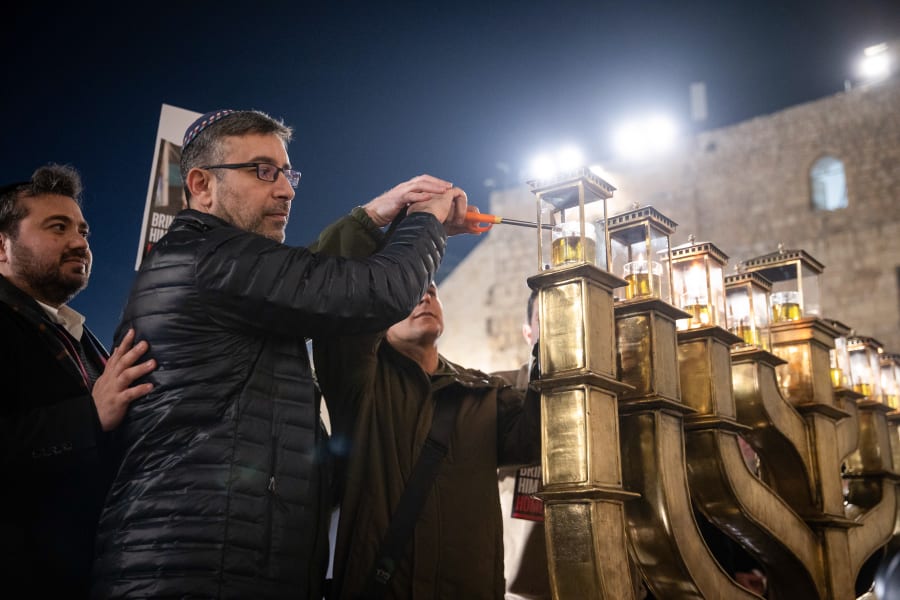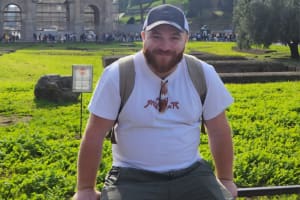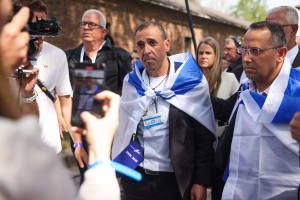Hanukkah at the Kotel: One-sided candle lighting sparks further call for gender equality at the Western Wall

The lighting of the Hanukkiah on the eighth and final night of Hanukkah is always a deeply moving experience at the Kotel (Western Wall) in Jerusalem. This year, the Western Wall Heritage Foundation marked the occasion of the eight-night Festival of Lights, also known as the Feast of Dedication, with a special schedule of honorees and speakers each night at the week-long event.
The program was designed to honor and remember the families of the fallen and those still being held hostage, ensuring their stories and sacrifices were incorporated into this sacred moment of reflection and light.
According to the foundation's website, the events “highlighted the theme, ‘For the miracles, the mighty deeds, and the wars,’ with the participation of rabbis, public figures, ambassadors, families of hostages, bereaved families, wounded IDF soldiers, IDF officers and soldiers, Israel Police officers and security forces, families, and the general public."
While the events are significant for most attendees, one group of observers has been outspoken about their exclusion by the organizers of the annual celebration: Women of the Wall.
The Women of the Wall is a group dedicated to bringing inclusion to women in Judaism, advocating for their rights to be a part of special mitzvot events, such as the candle lighting and saying blessings, as a way to actively participate in the celebration of Hanukkah and other important occasions.
As reported by Haaretz, in a letter to Religious Services Ministry Director-General Yehuda Avidan, Women of the Wall CEO Yochi Rappeport wrote, "Preparations are underway for the Hanukkah events at the Western Wall, and we want to warn in advance about systematic failures and gender inequality at the Western Wall, as there have been for many years."
The organization, she explains, will once again hold its own candle lighting in the women's section this year. "We won't wait for an answer from them. We have a menorah made of 36 different parts, brought in by 36 women – each one brings in a small piece. We can put it together in five minutes, even in the dark, even in the rain.”
"We'll light it as we do every year. It is the only menorah in the women's section, and it's a menorah that a stubborn organization like ourselves brings in in pieces." She added, "Like the crypto-Jews in Inquisition-era Spain, we need to hide a menorah at the holiest site for the Jewish people. We need to hide it, to bring it in in secret, so that women can light Hanukkah candles in Israel."
Rabbi Shmuel Rabinowitz of the Western Wall and the Western Wall Heritage Foundation, which oversees the site, urged "the few women who are invited to light candles at the ceremony to light secondary candles on the balcony that overlooks the Western Wall. Even there, the women are just standing and are not invited to bless the candles and take an active part in the mitzvot of the holiday.”
In the year 2000, the Women of the Wall initiated a protracted legal battle in the High Court of Justice. By 2003, a panel of nine judges reached a compromise, stating, “The Western Wall is for the entire people of Israel, not just part of it.”
However, they also determined that Women of the Wall does not have unrestricted rights at the site and its members needed to “minimize the offense caused to other observant people during the times the Women of the Wall pray, and in this way also prevent serious incidents during altercations between the different camps.”
Although the court did not grant the group unrestricted rights, such as reading the Torah publicly or wearing a prayer shawl, the group did protest the court's decision without officially challenging or appealing it.
In 2015, Women of the Wall and other women's rights organizations issued a letter either calling for women to be permitted to take part in a state-sponsored mixed-gender ceremony in the plaza next to the segregated prayer areas, or to be granted the right to hold their own ceremony in the women's section.
The request was rejected and described by Rabinowitz as "extremist" and "fanatic," further calling the demand a "media provocation."

The All Israel News Staff is a team of journalists in Israel.
You might also like to read this:

















